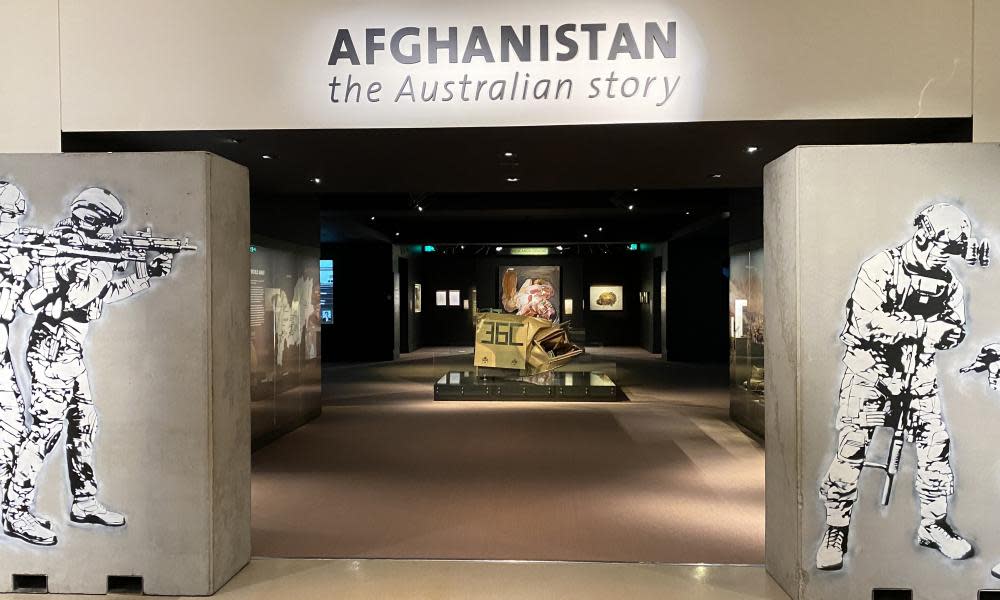PM says War Memorial council members like Abbott and Stokes will ensure it handles war crimes allegations well

Scott Morrison has expressed confidence the Australian War Memorial will “respect the defence force” in its handling of findings of alleged war crimes, citing appointments to its council including Tony Abbott as a guarantee it will handle the matter sensitively.
The prime minister made the remarks in response to the memorial director, Matt Anderson, arguing that Australians would “expect to see” the findings of the Brereton report into alleged war crimes by special forces in Afghanistan acknowledged.
Morrison’s intervention cuts across Anderson’s comments that in practice the council exercises little direct control over the content of exhibitions because it has trust in “curatorial and historical teams and gives them free range to arrive at the best treatment of the subjects”.
Related: Australia's entire SAS regiment must be disbanded after Brereton report, expert says
The Brereton report found Australian special forces were allegedly involved in the murder of 39 Afghan civilians, in some cases allegedly shooting prisoners to “blood” junior soldiers before inventing cover stories and planting weapons on corpses.
Anderson told the Sydney Morning Herald that when people come to the War Memorial “because of the significance of the report and arguably because of the media attention … they would expect to see [the report] acknowledged, and we will seek to do that”.
He said the “overwhelming majority” of Australian troops in Afghanistan “served courageously, competently and effectively” and promised to tell that story.
“If the eventual findings, the legal processes, find that some didn’t then that will be acknowledged too, because we tell the truth.”
On Wednesday Morrison played down concerns Australian troops could be “named and shamed” at the War Memorial, telling 2GB Radio he did “not think that’s necessarily what [Anderson is] proposing at all”.
“Let’s not get ahead of ourselves [about] what’s been proposed here … we haven’t seen anything specific there,” he said.
Morrison said the War Memorial council had people with a “lot of experience” who would “work closely with the War Memorial director” on how to handle the issue.
“The War Memorial board, which has oversight over this, has people on there like Tony Abbott … Daniel Keighran, [Air] Marshal Mel Hupfeld, [chairman] Kerry Stokes … [and] Wing Commander Sharon Brown.
“We should wait and see how the War Memorial is proposing to handle this very sensitive matter.
“My simple point is we’ve got a board that sits over those decisions, which has got a lot of very sensible people … who have a good understanding of how this issue needs to be sensitively dealt with, and respecting defence force, and upholding the integrity of that process.
“I have a lot of confidence in them – that’s why we appointed them.”
Morrison declined to express a view on whether visitors would expect the alleged war crimes to be acknowledged, arguing it “depends what that means”.
The federal government has established an office of the special investigator in the Department of Home Affairs to build briefs of evidence and make referrals to the commonwealth director of public prosecutions.
Morrison said the process was a “a proper justice process” that would guarantee the principle of “innocent until proven guilty” was upheld.
He dead-batted questions about whether special forces should be stripped of awards. The chief of the defence force, General Angus Campbell, has foreshadowed a review into honours and awards, including a move to revoke the meritorious unit citation awarded to Special Operations Task Group rotations serving in Afghanistan between 2007 and 2013.
Morrison acknowledged the issue was “sensitive”, “controversial” and “complex” but said he would not provide a “running daily commentary” when no decisions have been made.
Stokes, the memorial’s chairman, has promised to help members of the Special Air Service regiment through an existing special fund that could, among other things, cover legal costs.
The promise prompted a call from the former AWM director Brendon Kelson for Stokes to resign, describing his position on the council as “untenable”.
Anderson defended Stokes continuing in the role. “I think people are losing sight of the fact that Kerry Stokes has had the best interests of veterans at heart for decades, long before he served on the council of the Australian War Memorial,” he reportedly said.

 Yahoo Movies
Yahoo Movies 
